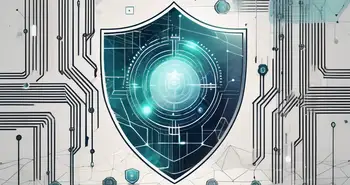The Future of Cybersecurity: Quantum-Resistant Cryptography

As an expert in the field of cybersecurity, I am constantly exploring new technologies and trends that could shape the future of our digital world. One such development that has been gaining significant attention is quantum computing and its potential impact on cryptography. In this article, we will delve into the world of quantum-resistant cryptography, understand the threats to current cryptographic methods, explore the principles and advantages of quantum-resistant cryptography, discuss the challenges in implementing it, and finally, examine the steps we can take to prepare for the quantum future.
Understanding Quantum Computing
Before we can fully grasp the implications of quantum-resistant cryptography, it is essential to first understand the basics of quantum computing. Unlike classical computers that use bits to represent either a 0 or 1, quantum computers use quantum bits or qubits. Due to the phenomena of quantum superposition and entanglement, qubits can exist in multiple states simultaneously, exponentially increasing the computational power of a quantum computer.
Quantum Computing and Cybersecurity
The emergence of quantum computing poses a significant threat to our current cryptographic methods. Many encryption algorithms that are considered secure today, such as RSA and ECC, rely on the computational complexity of factoring large numbers or solving the discrete logarithm problem. However, quantum computers have the potential to break these algorithms using Shor's algorithm, which can efficiently factor large numbers and solve the discrete logarithm problem, rendering current encryption methods vulnerable.
Furthermore, quantum computing has the potential to revolutionize various fields beyond just cryptography. For instance, in the realm of drug discovery, quantum computers can simulate molecular interactions with unprecedented accuracy and speed. This capability can lead to the rapid development of new drugs and treatments for various diseases, significantly cutting down the time and resources required for traditional drug discovery processes.
Moreover, quantum computing is also poised to transform the field of artificial intelligence. Quantum machine learning algorithms have the potential to process and analyze vast amounts of data much faster than classical computers, leading to advancements in areas such as natural language processing, image recognition, and predictive analytics. The marriage of quantum computing and artificial intelligence could usher in a new era of innovation and technological advancement.
The Threat to Current Cryptography
Vulnerabilities in Current Encryption Methods
As quantum computing progresses, the vulnerabilities in our current encryption methods become more apparent. Adversaries armed with quantum computers would have the ability to decipher encrypted data, compromising the confidentiality of sensitive information such as personal data, financial transactions, and national security secrets. This highlights the urgent need to develop new encryption techniques that are resistant to quantum attacks.
Quantum Computing and Cryptanalysis
With the advent of quantum computing, cryptanalysis tools will also evolve. Attackers equipped with quantum computers could potentially break cryptographic keys, expose weaknesses in encryption algorithms, and exploit vulnerabilities in communication protocols. The race to develop quantum-resistant cryptography has never been more critical.
The impact of quantum computing on cryptography extends beyond data security. Industries that rely heavily on encryption, such as banking, healthcare, and government agencies, are at risk of significant disruptions if quantum-safe solutions are not implemented in time. The potential consequences of a breach in encrypted systems could lead to financial losses, privacy violations, and even threats to national security.
Furthermore, the transition to quantum-resistant cryptography is not a simple task. It requires a coordinated effort from researchers, industry experts, and policymakers to develop and implement new encryption standards that can withstand the power of quantum computers. This collaborative approach is essential to ensure a smooth and secure transition to a post-quantum cryptographic era.
Quantum-Resistant Cryptography: The Future of Cybersecurity
Principles of Quantum-Resistant Cryptography
Quantum-resistant cryptography aims to provide security in the face of quantum computing advancements. One of the most promising approaches is the use of post-quantum cryptographic algorithms that rely on mathematical problems that are believed to be resistant to quantum attacks. These algorithms, such as lattice-based, code-based, and multivariate-based cryptography, offer a viable path forward in protecting sensitive information from the threat of quantum computers.
Advantages of Quantum-Resistant Cryptography
Beyond the immediate goal of protecting against quantum attacks, quantum-resistant cryptography also offers additional advantages. These include increased resilience against classical attacks, improved efficiency and scalability, and the ability to seamlessly integrate with existing cryptographic systems. By adopting quantum-resistant cryptography, organizations can future-proof their systems and safeguard sensitive data.
Challenges in Implementing Quantum-Resistant Cryptography
Technological Hurdles
Implementing quantum-resistant cryptography poses various technological challenges. Developing and standardizing new algorithms, ensuring interoperability with existing systems, and adapting hardware and software infrastructure are just a few of the hurdles that must be overcome. Collaboration among researchers, industry, and governments is crucial to address these challenges and expedite the adoption of quantum-resistant cryptography.
Economic and Policy Considerations
The adoption of quantum-resistant cryptography also raises economic and policy considerations. Organizations must evaluate the cost of transitioning to new cryptographic systems, including hardware updates and personnel training. Additionally, governments need to establish regulatory frameworks and standards to ensure the secure and standardized implementation of quantum-resistant cryptography across industries.
Preparing for the Quantum Future
Steps Towards Quantum-Resistant Cybersecurity
While the quantum future may seem daunting, there are steps we can take today to enhance our cybersecurity resilience. Organizations should begin by assessing their current cryptographic systems and identifying areas that are most vulnerable to quantum attacks. It is crucial to stay updated with the latest developments in post-quantum cryptography research and collaborate with experts to explore potential solutions.
The Role of Government and Industry in Quantum-Resistant Cryptography
The development and adoption of quantum-resistant cryptography require a coordinated effort from both government and industry. Governments should allocate resources to fund research, promote collaboration, and establish policies that incentivize the adoption of quantum-resistant cryptographic standards. Industry leaders should actively engage in the development and standardization process, ensuring compatibility and interoperability across different systems and platforms.
As an expert in the field of cybersecurity, I have witnessed firsthand the evolving landscape of threats and the urgent need for robust cryptographic systems. It is vital that we embrace the concept of quantum-resistant cryptography to protect our sensitive data from the growing threat of quantum computing. By taking proactive measures and working together, we can pave the way for a secure and resilient digital future.
FAQ
What is quantum computing?
Quantum computing is a revolutionary computing paradigm that utilizes quantum bits or qubits to perform computations. Unlike classical computers that use bits to represent either a 0 or 1, qubits can exist in multiple states simultaneously, exponentially increasing computational power.
Why is quantum computing a threat to current cryptography?
Quantum computers have the potential to break our current encryption methods that rely on the computational complexity of factoring large numbers or solving the discrete logarithm problem. With the advent of quantum computing, attackers equipped with quantum computers could decipher encrypted data, compromising the confidentiality of sensitive information.
What is quantum-resistant cryptography?
Quantum-resistant cryptography refers to cryptographic algorithms and protocols designed to withstand attacks from quantum computers. These algorithms rely on mathematical problems that are believed to be resistant to quantum attacks, offering security in the face of advancements in quantum computing technology.
What are the advantages of quantum-resistant cryptography?
Aside from protecting against quantum attacks, quantum-resistant cryptography offers increased resilience against classical attacks, improved efficiency and scalability, and the ability to seamlessly integrate with existing cryptographic systems. Adopting quantum-resistant cryptography allows organizations to future-proof their systems and safeguard sensitive data.
What are the challenges in implementing quantum-resistant cryptography?
Implementing quantum-resistant cryptography entails tackling technological hurdles, such as developing and standardizing new algorithms, ensuring interoperability with existing systems, and adapting hardware and software infrastructure. Additionally, economic and policy considerations, including the cost of transitioning and establishing regulatory frameworks, must be addressed.
What steps can organizations take to prepare for the quantum future?
Organizations can start by assessing their current cryptographic systems and identifying areas that are most vulnerable to quantum attacks. Staying updated with the latest developments in post-quantum cryptography research and collaborating with experts are essential. Furthermore, governments and industry leaders should actively collaborate to drive the development and adoption of quantum-resistant cryptographic standards.
As we navigate the complexities of a quantum future, the importance of secure and innovative trading platforms like Morpher becomes ever more apparent. Morpher.com is not just ahead of the curve in offering zero fees, infinite liquidity, and a unique trading experience; it's also a platform that understands the critical nature of cybersecurity in the blockchain space. By choosing Morpher, you're opting for a platform that values safety and control, with a non-custodial wallet that ensures your investments are protected against the emerging threats of quantum computing. Ready to take part in the future of trading with peace of mind? Sign Up and Get Your Free Sign Up Bonus today and join the revolution that's reshaping the investment landscape.

Disclaimer: All investments involve risk, and the past performance of a security, industry, sector, market, financial product, trading strategy, or individual’s trading does not guarantee future results or returns. Investors are fully responsible for any investment decisions they make. Such decisions should be based solely on an evaluation of their financial circumstances, investment objectives, risk tolerance, and liquidity needs. This post does not constitute investment advice.

Painless trading for everyone
Hundreds of markets all in one place - Apple, Bitcoin, Gold, Watches, NFTs, Sneakers and so much more.

Painless trading for everyone
Hundreds of markets all in one place - Apple, Bitcoin, Gold, Watches, NFTs, Sneakers and so much more.









